人教部编版初二下册英语重点知识点梳理
初二英语下册知识点归纳人教版
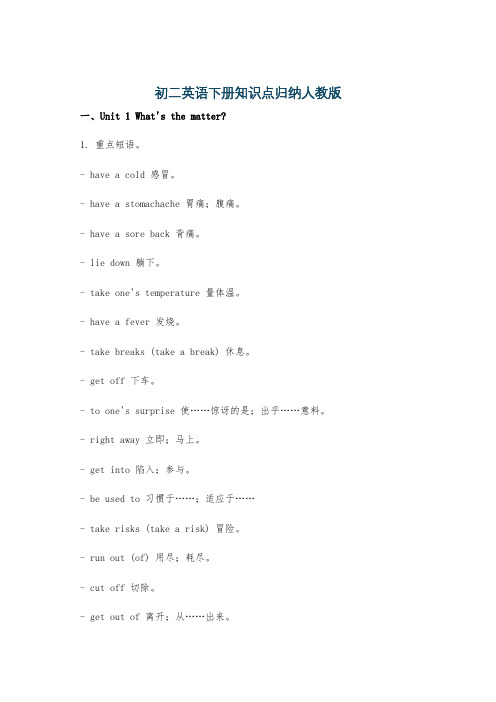
初二英语下册知识点归纳人教版一、Unit 1 What's the matter?1. 重点短语。
- have a cold 感冒。
- have a stomachache 胃痛;腹痛。
- have a sore back 背痛。
- lie down 躺下。
- take one's temperature 量体温。
- have a fever 发烧。
- take breaks (take a break) 休息。
- get off 下车。
- to one's surprise 使……惊讶的是;出乎……意料。
- right away 立即;马上。
- get into 陷入;参与。
- be used to 习惯于……;适应于……- take risks (take a risk) 冒险。
- run out (of) 用尽;耗尽。
- cut off 切除。
- get out of 离开;从……出来。
- be in control of 掌管;管理。
2. 重点句型。
- What's the matter? = What's wrong? = What's the trouble? 怎么了?- Should I put some medicine on it? 我应该在它(伤口)上敷些药吗?- You should lie down and rest. 你应该躺下休息。
- He hurt himself in P.E. class. 他在体育课上伤到了自己。
- Aron Ralston is an American man who is interested in mountain climbing. 阿伦·罗尔斯顿是一个对登山感兴趣的美国人。
3. 语法。
- 情态动词should的用法:should表示“应该”,用来提出建议或劝告,后接动词原形。
例如:You should see a dentist. 否定形式为shouldn't,例如:You shouldn't go to school late.二、Unit 2 I'll help to clean up the city parks.1. 重点短语。
人教版初中英语八年级下册全册各单元知识点、语法归纳整理
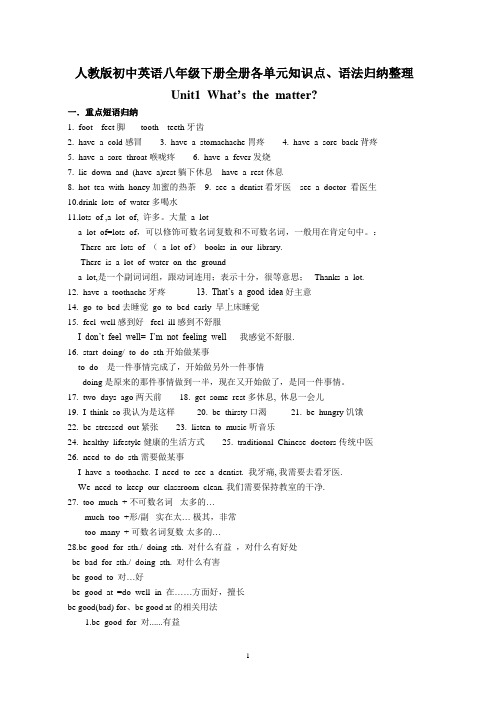
人教版初中英语八年级下册全册各单元知识点、语法归纳整理Unit1 W hat’s the matter?一.重点短语归纳1. foot---feet 脚tooth---teeth 牙齿2. have a cold 感冒3. have a stomachache 胃疼4. have a sore back背疼5. have a sore throat喉咙疼6. have a fever发烧7. lie down and (have a)rest 躺下休息have a rest 休息8. hot tea with honey 加蜜的热茶9. see a dentist 看牙医see a doctor 看医生10.drink lots of water多喝水11.lots of ,a lot of, 许多。
大量a lota lot of=lots of,可以修饰可数名词复数和不可数名词,一般用在肯定句中。
:There are lots of (a lot of)books in our library.There is a lot of water on the grounda lot,是一个副词词组,跟动词连用;表示十分,很等意思;Thanks a lot.12. have a toothache牙疼13. That’s a good idea好主意14. go to bed 去睡觉go to bed early 早上床睡觉15. feel well感到好 feel ill 感到不舒服I don’t feel well= I’m not feeling well我感觉不舒服.16. start doing/ to do sth开始做某事to do 是一件事情完成了,开始做另外一件事情doing是原来的那件事情做到一半,现在又开始做了,是同一件事情。
17. two days ago两天前18. get some rest 多休息, 休息一会儿19. I think so我认为是这样20. be thirsty口渴21. be hungry 饥饿22. be stressed out紧张23. listen to music听音乐24. healthy lifestyle健康的生活方式25. traditional Chinese doctors传统中医26. need to do sth 需要做某事I have a toothache. I need to see a dentist. 我牙痛, 我需要去看牙医.We need to keep our classroom clean. 我们需要保持教室的干净.27. too much + 不可数名词太多的…much too +形/副实在太…极其,非常too many + 可数名词复数太多的…28.be good for sth./ doing sth. 对什么有益,对什么有好处be bad for sth./ doing sth. 对什么有害be good to 对…好be good at =do well in 在……方面好,擅长be good(bad) for、be good at的相关用法1.be good for 对......有益Doing morning exercises is good for your health.做早操对你们的建康有益。
人教部编版八年级英语下册第二单元笔记重点汇总(可直接打印)
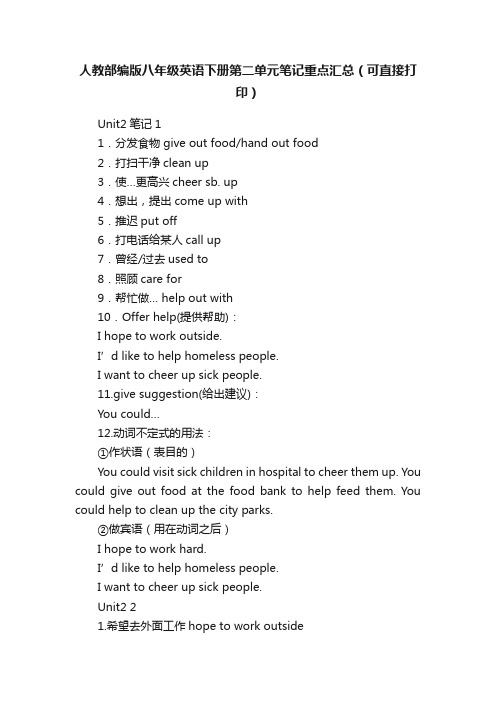
人教部编版八年级英语下册第二单元笔记重点汇总(可直接打印)Unit2笔记11.分发食物give out food/hand out food2.打扫干净clean up3.使…更高兴cheer sb. up4.想出,提出come up with5.推迟put off6.打电话给某人call up7.曾经/过去used to8.照顾care for9.帮忙做… help out with10.Offer help(提供帮助):I hope to work outside.I’d like to help homeless people.I want to cheer up sick people.11.give suggestion(给出建议):You could…12.动词不定式的用法:①作状语(表目的)You could visit sick children in hospital to cheer them up. You could give out food at the food bank to help feed them. You could help to clean up the city parks.②做宾语(用在动词之后)I hope to work hard.I’d like to help homeless people.I want to cheer up sick people.Unit2 21.希望去外面工作hope to work outside2.帮助摆脱饥饿help stop hunger(名词)3.食物赈济处food bank4.课后学习活动an after-school study program5.想出/提出一个计划come up with a plan6.推迟制定计划put off making a plan7.张贴标语put up signs8.写一些公告make some notices9.需要做某事need to do …10.在敬老院in an old people’s home11.让某人做某事ask sb. to do …12.帮助解决某事help out with sth.13.给我讲过去的故事tell me stories about past14.是孤独的/感觉孤独be lonely / feel lonely15.听/倾听listen to16.照顾他们care for themSection A 3a 笔记1.students who volunteer 做志愿服务的学生2.give up several hours to do sth.花费几个小时去做某事(动词不定式表目的)spend several hours doing sth. 花费几个小时做某事3.give up doing sth. 放弃做某事4.get such a strong feeling of satisfaction/joy 产生如此强烈的满足感/喜悦感get a feeling of happiness / joy / being helpful / satisfaction 产生幸福/快乐/助人/满足感5.the look of joy 快乐的表情6.on their owners’ faces 在他们主人们的脸上7.at the age of 4 在四岁的时候8.try out for…参加…的选拔9.go on a different journey 进行一次不一样的旅行10.a dream come true 梦想成真… is a dream come true for me.↓(名词/动名词)例:Volunteering here is a dream come true for me.Going on vacation in Yunnan is a dream come true for me.11.at the same time 同时Grammar Focus动词不定式的用法:(必须掌握三种基本用法)一、动词不定式作宾语:(用于动词之后)①want to do sth.②hope to do sth.③try/decide等等之后跟to do sth.二、作宾补(用于宾语之后)①would like sb. to do sth.②tell sb. to do sth.③ask / want / allow等等三、作状语1.We make some signs to put up around the school. (表目的)2.be+adj.(表示心情)+to do(作原因状语)I am sorry to trouble you. 补充其他用法:四、作主语:To be an engineer is my dream.五、作表语(用在be动词之后)His aim is to win the first prize.六、作定语:I’d like something to drink.(喝的东西)七、特殊疑问词+to do sthI don’t know how to plant a tree.Section B (1a-1e) 笔记1、take after=be similar to 与……像,相似(外貌、行为方面)look after 看起来像(多指外貌)2、修理:fix up fix it up (代词放中间)修理:repair修补:mend3、give away sth. to sb. 把某物赠送给某人give away 赠送,泄露give up 放弃give in (to) 屈服,投降give out 分发,用完耗尽4、broken bicycle parts 损坏的自行车部分My bike is broken. 我的自行车坏了。
人教版八年级英语下册重要语法知识点汇总

人教版八年级英语下册重要语法知识点汇总人教版八年级英语下册重要语法知识点汇总1. 否定句型1) 一般否定句I dnt knw this. N news is gd news.There is n persn (ske)/nt a persn/nt any persn (ske) in the huse.2)特指否定He went t his ffie, nt t see hi.I a srry fr nt ing n tie.I dnt think/believe/suppse/feel/iagine yu are right.3)部分否定All the answers are nt right//All is nt gld that glittersI dnt knw all f the.//I ant see everybdy/everything.Bth f the are nt right.4)全体否定Nne f y friends ske.//I an see nthing/nbdy.Neither f the is right.//Nthing an be s siple asthis.5) 延续否定yu didnt see hi, neither/nr did I.yu dnt knw, I dnt knw either.He desnt knw English, let alne/t say nthing f/nt t speak f (更不用说) Frenh.6) 半否定句e seld/hardly/sarely/barely hear suh fine singing.I knw little English. I saw few peple.7) 双重否定yu ant ake sething ut f nthing.//hats dne annt be undne.There is n sweet withut sweat.//N gain withut pains.I ant help /keep/ laughing whenever I hear it.N an is s ld but (that) he an learn.8)排除否定Everyne is ready exept yu.//He did nthing but play.But fr yur help, I uldnt d it.9)加强否定I wnt d it at all.//I ant see it any re.//He is n lnger a by.2. 判断句型1) 一般判断句It is iprtant fr us t learn English.It is kind f yu t help e sinere eans hnest.The by is alled/naed T.e regarded/nsider it as an hnr.2)强调判断It is English that we shuld learn.//It is he wh helped e a lt.3)弱式判断yur sentene desnt sund/lk/appear/feel right.yu lk/see as if/as thught yu had been there befre.aybe/Perhaps/ she is ill.He is prbably ill.//He is likely ill. //It is pssible that he is late4) 注释判断He an reeber s any English wrds, that is (t say) he is a living ditinary.(活字典)5) 正反判断That sunds all right, but in fat it is nt.6) 比较判断It is re a piture than a pe.7) 互斥判断He r yu are wrng. Either he is right r I a.3. 祝愿祁使句式1) 一般句式Study hard and keep fit. Be brave! Dnt be shy! Get ut f here.2)强语式D tell e. Never tell a lie.3) 委婉祈使句Please tell e the true. uld/ill/nt d e a favr?uld/D yu ind y sking? hat/Hw/ abut ging n ft?4)建议祈使句Let us g. Let us knw the tie. Dnt let the fire ut.Lets nt waste the tie. yud better start early.Shall we listen t se usi? hy dnt yu get sething t drink?Suppse/suppsing yu pik e up at abut six?I suggest we (shuld) take the train.5)祝愿句Suess t yu! //ish yu a gd urney.ay yu have a happy arriage. //Heres t yur suess!Allw e t prpse a tast t ur friendship!4. 感叹句型Hw well he speaks! //Hw kind she is! //hat a nie weather it is!Here he es! //Suh is life! //nderful! // Help!5. 疑问句型1) 一般疑问句Is he a dtr?//D yu the way t the statin?2)反意疑问句He is a teaher, isnt he?//It is quite heap, dnt yu think?3) 特殊疑问句hat is the distane/width/size/ppulatin/teperature/fare?h is he? hat is he?(干什么的)//hat is he like? // Hw is he?Hw d yu like hi? //hat d yu think f hi?hat ever d yu ean by saying this?4)选择疑问句He is a dtr r a nurse?5)间接疑问句D yu knw hw ld he is? //Tell e if (whether) yu like it.hat d yu think/say/suppse I shuld d?6. 数词句型1) 表数目It is exatly ten lk.//It is five iles away fr here.He is re than/ver/ at least nt less than 20.He is under/at st/n re than 20.2)表年月日He was brn n April 22 1994/in 1994 n the rning f t.1.3)表年龄He is 20 years ld/years f age.//He is at the agef 10.4)表倍数It is fur ties that f last years.This is fur ties as big (again) as that ne.This is fur ties bigger than that ne.The ine is duble what it was.The utput f al was 200% greater than in 1998.5)表计量It is 10 eters lng/wide/high.//It sts e 100 yuan.I spent 10 hurs t finish it.//It tk e 10 days t finish it.It is wrth 100 yuan.7. 关联指代句型1)两项关连I have tw bks, ne is hinese; the ther English.I have five bks, ne is hinese; the thers English.T say is ne thing, but/and/ t d is anther.ne the ne hand, I a yur teaher, and n the ther hand, I a als yu friend.Se like t play ftball, thers are fnd f basketball.2)先后顺序First/firstly, I wish gd health, send/sendly suess in yur study, third/thirdly gd luk in everything.First stp, then lk, finally rss.At first/in the beginning/ he wrd hard. Later/Afterwards he is nt s diligent.3)修饰限制This is the sae bk as I lst yesterday.This is the sae bk that I lst yesterday.(同一本书)Dnt trust suh a an as ver praise yu.He/ne/Thse/They wh shuld e failed t appear.A an/A persn/The ne/Anyne/Peple wh saw her liked her very uh.The day/tie/ent will e when hina is strngest in the wrld.4) 两项连接He an speak nt nly English but als Frenh.The bk is bth interesting and instrutive.It is neither ld nr ht.Please either e in r g ut.The ld wrker has experiene and knwledge as well.5)加和关系Besides literature, we have graar and writing.Apart fr xygen, there are se ther gases in the air.In additin t "if", there is any ther nuntins that an intrdue nditinal lauses.I ust g nw, inidentally, if yu want that bk.yu see t like tea, s d I.8. 比较句型1)等比句He is as tall as I. // He is the sae height as I.She is n less diligent than he. The lab is n better than a ttage.2) 差比句I speak English wrse than he des.//He is nt s/astall as I a.ur knwledge is uh inferir t their.3) 极比句He is the tallest f all in the lass.Nne/N ne/ is s blind as thse that wnt see.Nthing is s easy as this.4)比例句The re a an knws, the re he feels his ignrane(无知).5) 择比句He is taller than any ther by in the lassIt is better late than never.//They wuld die than live as slavesHe prefers ding t talking//He prefers t d rather than t talk.He prefers atheatis t English.//Id rather stay here.6)对比句yu think e idle, but n the ntrary, I a busy.They are wrking hard while yu are wasting yur tie.9. 比喻句型e ust wrk like hi.//He behaves as his father des.He speaks English as if/thugh he was a freigner.10. 条件假设句1) 一般事实If we sueed, what will the peple say?Suppse it rains, what shall we d?Persevere(坚持) and yull sueed.2)虚拟条件句If I were yu, I wuld g.//If yu had seen it, yu wuld have been ved.3)反条件句Unless yu try, yull never sueed.//Dnt ve, r/else/therwise Ill sht.4)唯一条件句If nly I have anther hane, I shall d better.nly in this way an we learn English well.S/As lng as we dnt lse heart, well sueed.5)推论条件句Sine that is s, there is n re t say.Nw that yu are grwn up, yu ust stp this behavir.11. 时间句型1)一般时hen I see hi, Ill tell hi.2) 表同时yull grw wiser as yu grw lder.rk while yu wrk, play while yu play.He wrked, at the sae/in the eantie he listened t the usi.3)限制时Every/eah tie when I went t his huse, he was ut.By the tie that we gt there, he was ut.4)交替时Seties he sings, seties he danes.At ne tie the baby ries, at anther it talks.5)先时I stpped he befre he began t talk with e.6)后时Ill tell yu after I finish it.7)紧接时As sn as I see hi, Ill tell hi.ne yu begin, yu ust ntinue.The (very) ent/instant (that) I saw hi, I regnized hi.n hearing the news, she bust int tears.Hardly had I seen the light, when I heard a lud thundering.8)延续时I havent seen hi sine I ae here.A friend is never knw till/until a an have need.12. 地点句型1) 一般地点here have yu been?here there is a will, there is a way.2)方位Hebei lies in the east f hina.apan is lies t the east f hina.The huse faes (t) the suth.He is sitting at the frnt f the lassrHe is standing in frnt f/befre e.He is sitting at the bak f/behind e.He is sitting in the bak f/at the rear f the lassr. He is sitting next t/besides e.He is sitting lse t/near e.At the tp f/n tp f the shelf, there are se bks. He is sitting n the left/right.The untain yu see t the right is the Purple untain.13. 原因句型He didnt g t shl beause he was ill.Sine we are all here, lets begin ur eeting.It ight rain yesterday, fr the grund was wet.Nw (that) we have finished the wrk, we an g he.I a glad t eet yu.I a srry that I hear that.Thank yu fr yur help.That is why he failed t e.He didnt e beause f/n aunt f the weather.He went ut f urisity.I sueeded thanks t his help.This failure is due t the fat they lak experiene.wing t ur int effrts, the task was fulfilled.hat are studying English fr?Fr what reasn did yu hse this?hats the pint f asking his t d that?Hw e yu never tld e abut it?hat with the wind and what with the rain, ur walk was spiled.14. 目的句型He stpped aside s that she uld g in.He sits in the frnt in rder that he an see wrds learly.He gets up early s as t/in rder t have tie t d exerises.He repeated it fr fear that there shuld be any istake.15. 结果句型It was very ld, s that the river frze.They st a lt f ney, s/therefre we use the arefully.He is suh a gd an that every ne likes hi.He ran s fast that n ne uld ath hi.He hurried t the huse nly t find that it was epty.I was aught in the rain. As a result, I had a bad ld.16. 程度句型Hw ften d yu write t yur parents?Hw lng d yu stay at he?It is s beautiful that we all lve it.It is t big fr yu.He is t exited t speak.He is nt ld enugh t knw this.The letter ust be sent as sn as pssibleyu ust wrk as hard as yu an.As far as I knw, I an speak nly English.17. 让步句型Thugh/Althugh he is rih, (yet/still) he desnt shw ff.yang as he is, he knw a lt f things.Even if/thugh he sueeded, he was nt prud.N atter what yu say, Ill still try t d it.keep al, whatever happens.In spite f this, we ust g ahead with ur plans.Regardless f all the diffiulties, well fight it ut t the end.18. 转折句型I searhed everywhere but uld nt find hi.yu ay g, nly return quikly.He is seriusly ill, still there is hpe f his revery.It lked like rain, hwever it was lear in the afternn.He is still yung, yet he is high up in the psitin.He didnt tell e the truth, I knw it, thugh.19. 省略句I think/say/suppse/expet/believe/hpe s.hy nt e earlier next tie?。
新版人教版八年级下英语语法重点归纳(全)

新版人教版八年级下英语语法重点归纳(全)一、名词名词是指用来表示人、事物、地方、动物等的名称的词语。
名词分为可数名词和不可数名词。
可数名词有单数和复数两种形式,而不可数名词只有单数形式。
- 可数名词:表示单数时,名词前面通常有冠词a/an或者其它数量词进行修饰;表示复数时,名词通常要在词尾加“s”。
- 不可数名词:不可数名词表示的是无法分为个体的物体、概念、抽象事物等,通常不能用于复数形式。
二、动词动词表示人或物的动作、行为、状态或存在的词语。
动词分为及物动词和不及物动词。
- 及物动词:及物动词后面可以直接接宾语,表示动作的承受者或影响对象。
- 不及物动词:不及物动词不能直接接宾语,它可以后面接副词或介词短语,表示动作发生的方式、状态等。
三、形容词形容词是用来描述名词性词语的词语。
它可以表示人或物的性质、状态、特征、颜色等。
- 形容词可以修饰名词,放在名词的前面。
- 形容词还可以通过加后缀“-er”和“-est”来比较级和最高级。
四、副词副词是用来修饰动词、形容词和其他副词的词语。
副词可以表示时间、地点、方式、程度、频率等。
- 副词在句中通常位于动词、形容词或者其他副词的前面。
- 副词的比较级和最高级可以通过在前面加上more和most来表示。
五、代词代词是用来代替名词或名词性的词语的词语。
代词可以分为人称代词、指示代词、疑问代词、不定代词等。
- 人称代词表示人的身份或人称,包括主格和宾格两种形式。
- 指示代词用来指示特定的人或物,可以表示近处的、远处的或已提到的事物。
- 疑问代词用于提问,通常用来询问人或事物的身份、性质、数量等信息。
- 不定代词用来指代不特定或泛指的人或物,表示数量或程度。
六、冠词冠词是位于名词前面用来修饰名词的词语。
冠词分为定冠词和不定冠词。
- 定冠词指特指某一具体的人或事物,有两种形式:定冠词“The”用于表示特定的人或物,而不定冠词“A/An”用于泛指任意的人或物。
七、介词介词是用来表示人或物之间关系的词语。
最全面人教版八年级下册英语各单元知识点总复习归纳总结

最全面人教版八年级下册英语各单元知识点总复习归纳总结Unit 1 How often do you exercise?词汇1. frequently 经常地2. hardly 几乎不3. ever 曾经4. once in a while 时不时5. rarely 很少语法一般现在时1. 频率副词放在动词前:I always read newspapers.2. 否定句用don't或doesn't+动词原形:I don't watch TV every day.3. 疑问句用do或does+主语+动词原形:Do you play soccer every week?Unit 2 I used to be afraid of the dark.词汇1. used to 过去常常2. get over 克服3. nervous 紧张的4. confident 有信心的5. stage 舞台语法1. Be used to+动名词表示惯或适应,I am used to studying English at night.2. Used to+动词原形表示过去常常,I used to read books every day.3. Get over+名词/代词/动名词,表示克服,She got over the flu last week.Unit 3 Could you please tell me where the restaurants are?词汇1. instruction 说明2. turn right/left 向右/左转3. excuse me 对不起4. straight 直走5. opposite 对面语法1. Could you please/could/may I+动词原形,请求礼貌地做事,Could you please help me with my English?2. Would like+名词 / 动名词,表示想要做某事,I would like to go shopping with you.3. May I ask+句子,礼貌地询问某事,May I ask where the restroom is?Unit 4 Why don't you talk to your parents?词汇1. conversation 对话2. listener 听众3. honest 诚实的4. conversation starter 聊天开场白5. effective 有效的语法1. How about/What about+动名词/名词,表示建议和提议,What about watching a movie?2. Why not+动词原形,表示建议和提议,Why not go swimming?3. Let's+动词原形,表示建议和提议,Let's have a party on the weekend.Unit 5 It must belong to Carla.词汇1. sweater 毛衣2. by accident 偶然地3. honest 诚实的4. lose 丢失5. owner 拥有者语法1. Can/Can't+动词原形,表示能力或可能性,I can dance.2. Must/Mustn't+动词原形,表示肯定或否定的推断,She must be the new teacher.3. Have/Has to+动词原形,表示必须做的事情,I have to finish my homework first.词汇1. graduate 毕业生2. physics 物理学3. ambitious 有抱负的4. career 职业5. education 教育语法一般将来时1. be going to+动词原形,表示打算做某事,I am going to see a film tonight.3. be + going to+现在进行时,表示不久会发生的事情,They are going to sing a song later.Unit 7 How do you make a banana milk shake?词汇1. recipe 食谱2. whip 打(奶油)3. peel 去皮4. slice 切片5. pour 倒语法1. What/How/Which+系动词+主语+谓语,表示特定的主语或具体的内容。
人教版八年级英语下册各单元知识点总结完整版

Unit 1 What’s the matter?一、重点短语1. have a fever 发烧2. have a cough 咳嗽3. have a toothache 牙疼4. talk too much 说得太多5. drink enough water 喝足够的水6. have a cold 受凉;感冒7. have a stomachache 胃疼8. have a sore back 背疼9. have a sore throat 喉咙痛10. lie down and rest躺下来休息11. hot tea with honey加蜂蜜的热茶12. see a dentist看牙医13. get an X-ray拍X光片14. take one’ s temperature量体温15. put some medicine on sth在……上面敷药16. feel very hot 感到很热17. sound like 听起来像18. all weekend 整个周末19. in the same way以同样的方式20. go to a doctor 看医生21. go along 沿着……走22. on the side of the road 在马路边23. shout for help 大声呼救24. without thinking twice 没有多想25. get off 下车26. have a heart problem 有心脏病27. to one’ s surprise 使……惊讶的28. thanks to 多亏了;由于29. in time及时30. save a life 挽救生命31. get into trouble 造成麻烦32. right away 立刻;马上33. because of 由于34. get out of 离开35. hurt oneself 受伤36. put a bandage on sth. 用绷带包扎37. fall down 摔倒38. feel sick 感到恶心39. have a nosebleed 流鼻血40. cut his knee割伤他的膝盖41. put her head back 把她的头向后仰42.have problems breathing呼吸困难43. mountain climbing登山运动44. be used to doing sth. 习惯做某事45. run out (of) 用完;用尽46. so that 以便47. so…that 如此……以至于……48. be in control of 掌管;管理49. in a difficult situation 在逆境屮50. keep on doing sth.坚持做某事51. make a decision做出决定52. take risks 冒险53. give up 放弃二、知识点解析1. What’s the matter? 怎么了?若是询问“某人怎么了?”要用“What’s the matter with sb.?”拓展:What’s the matter with sb.? 的同义句:What’s wrong with sb.? / What’s the trouble with sb.?2.疾病类短语:have a +疾病. e.g. :have a fever 发烧have a cold 感冒have a cough 咳嗽.have a +身体部位-ache. e.g.: have a headache 头痛have a toothache 牙痛.have a sore+身体部位. e.g.: have a sore throat咽喉痛have a sore back背痛例题:Mom, I____________.I’m sorry to hear that, dear. We must go to see the dentist right away.A. have a headacheB. have a stomachacheC. have a toothacheD. have a fever3. lie down 躺下V. 躺,平躺。
人教版初中英语八年级下册英语知识点
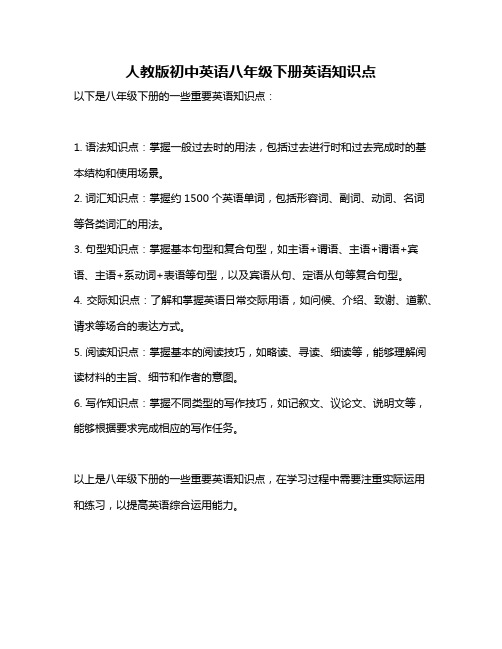
人教版初中英语八年级下册英语知识点
以下是八年级下册的一些重要英语知识点:
1. 语法知识点:掌握一般过去时的用法,包括过去进行时和过去完成时的基本结构和使用场景。
2. 词汇知识点:掌握约1500个英语单词,包括形容词、副词、动词、名词等各类词汇的用法。
3. 句型知识点:掌握基本句型和复合句型,如主语+谓语、主语+谓语+宾语、主语+系动词+表语等句型,以及宾语从句、定语从句等复合句型。
4. 交际知识点:了解和掌握英语日常交际用语,如问候、介绍、致谢、道歉、请求等场合的表达方式。
5. 阅读知识点:掌握基本的阅读技巧,如略读、寻读、细读等,能够理解阅读材料的主旨、细节和作者的意图。
6. 写作知识点:掌握不同类型的写作技巧,如记叙文、议论文、说明文等,能够根据要求完成相应的写作任务。
以上是八年级下册的一些重要英语知识点,在学习过程中需要注重实际运用和练习,以提高英语综合运用能力。
人教版英语八年级下册知识点总结

人教版英语八年级下册知识点总结一、语法知识点1. 时态:掌握一般现在时、一般过去时、一般将来时、现在进行时、过去进行时、过去将来时等时态的用法。
2. 过去进行时:用于表示过去某一时间正在进行的动作或状态。
3. 以下代词和副词的用法:- somebody, anybody, nobody, everybody 可用作主语或宾语。
- something, anything, nothing, everything 可用作主语或宾语。
- somewhere, anywhere, nowhere, everywhere 可用作地点副词。
4. 句型:掌握各种基本句型,如祈使句、选择疑问句、反义疑问句等。
5. 状语从句:掌握时间、原因、结果、条件等类型的状语从句的用法,并注意从句的引导词。
6. 定语从句:研究使用关系代词 who, whom, whose, which, that 引导定语从句,并了解先行词和关系词在从句中的作用关系。
二、词汇知识点1. 词汇拼写和用法:巩固和扩大基础词汇量,掌握词汇的正确拼写和用法。
2. 同义词和反义词:研究常用的同义词和反义词,提高词汇表达的能力。
3. 词组和固定搭配:掌握常用的词组和固定搭配,能够灵活运用。
三、阅读知识点1. 阅读理解:提高阅读理解能力,掌握快速获取信息的技巧。
2. 阅读策略:研究使用各种阅读策略,如扫读、略读、详读、推断等。
3. 阅读技巧:培养良好的阅读惯和技巧,如划重点、标记陌生单词等。
四、写作知识点1. 写作结构和组织:研究写作时合理安排文章结构和组织思路,使内容连贯。
2. 信息衔接和过渡:掌握信息衔接和过渡的方法,使文章各部分之间有逻辑性。
3. 词汇和句型运用:运用丰富的词汇和多样的句型,提高写作表达的准确性和流畅性。
以上为人教版英语八年级下册的主要知识点总结,希望能帮到你!。
八年级英语人教版下知识点

八年级英语人教版下知识点八年级英语人教版下是学习英语中重要的一年,需要整理和掌握大量的语法知识点和词汇。
下面将为大家提供一些重要的知识点的梳理和讲解。
一、语法知识点1.动词时态英语中共有十二种时态,但在八年级教学中重点掌握的是一般现在时、一般过去时、一般将来时等基本时态,以及现在进行时、过去进行时等进行时态。
要正确运用不同的时态,需要理解它们的基本含义和使用法则。
2.非谓语动词非谓语动词包括不定式、动名词和分词,用于表示动作或状态。
要注意它们与其他部分的搭配和用法。
例如,需要注意to do和doing的区别,以及分词作定语时需要注意其逻辑关系和修饰对象的用法。
3.名词性从句名词性从句包括主语从句、宾语从句、表语从句和同位语从句,由一个或多个词汇组成,作为一个整体充当名词的一部分。
要注意从句引导词的用法和从句与主句间的逻辑关系。
4.条件句条件句包括真实条件句和虚拟条件句,用于表示不同的假设情况和结果。
特别要注意虚拟条件句的形式和用法,如虚拟语气的变化和虚拟条件句的时态。
二、词汇知识点1.动词短语动词短语包括及物动词和不及物动词短语,例如get up、turn on、go out等。
掌握这些动词短语可以极大地增强我们的口语表达能力,在口语交流中起到重要的作用。
2.固定搭配固定搭配是指由两个或多个词汇共同组成的不可分割的短语,具有固定的意义和用法。
一些重要的固定搭配包括短语动词、习语和成语等。
例如take care of、fall in love with、by the way等。
3.情态动词情态动词是英语中一类特殊的动词,包括can、should、will、would等。
它们用于表示能力、建议、意愿、推测等方面,需要掌握它们的基本用法和意义,多多练习以提高自己的语感。
三、阅读技巧1.预测推断法预测推断法是指在阅读之前,通过标题、插图和关键词等信息,逐步猜测文章的大意和结构,以查找自己需要的信息。
这种方法可以提高阅读的效率和速度。
2023年部编人教版英语八年级下册全册知识点归纳

2023年部编人教版英语八年级下册全册知识点归纳本文档旨在归纳2023年部编人教版英语八年级下册全册的知识点。
以下是各个单元的重点内容:Unit 1: What’s the matter?- Vocabulary:- Health and illness-related words and phrases- Grammar:- Present continuous tense for talking about current health problems - Expressing and responding to health issues and giving adviceUnit 2: How often do you exercise?- Vocabulary:- Words and phrases related to leisure activities and exercise- Grammar:- Adverbs of frequency to talk about routine activities- Present simple tense for making generalizations- Discussing exercise routines and habitsUnit 3: Why don’t you get her a scarf?- Vocabulary:- Words and phrases related to gifts and shopping- Grammar:- Imperatives for making suggestionsUnit 4: I want to be an actor.- Vocabulary:- Words and phrases related to professions and aspirations- Grammar:- Future plans using "want to" and "going to"- Talking about future goals and aspirationsUnit 5: What were you doing when the rainstorm came?- Vocabulary:- Words and phrases related to past activities and weather events- Grammar:- Past continuous tense for talking about interrupted activities- Describing past events and experiencesUnit 6: Do you like bananas?- Vocabulary:- Words and phrases related to food preferences and dietary habits- Grammar:- Questions and short answers for asking about preferences- Expressing likes and dislikes以上是2023年部编人教版英语八年级下册全册的知识点归纳。
人教版八年级英语下册各知识点归纳总结

千里之行,始于足下。
人教版八年级英语下册各知识点归纳总结
人教版八年级英语下册的各知识点归纳总结如下:
1. 职业和家庭:学习如何描述职业、谈论家庭成员和家庭活动,如询问职业、描述人物、说明工作地点等。
2. 爱好和兴趣:学习如何描述爱好和兴趣,如谈论体育运动、音乐、电影、读书等。
3. 交通和旅行:学习如何描述交通工具、问路和旅行方面的话题,如描述公共交通工具、询问路线、购买车票等。
4. 环保与保护:学习如何描述环保和保护环境的行为,如讨论环境问题、讨论减少污染的方法、倡导保护野生动植物等。
5. 书信和便条:学习如何写书信和便条,如写自我介绍信、道歉信、邀请信等。
6. 教育和学习:学习如何描述学校和学习,如谈论学校设施、描述学习方法、讨论学业压力等。
7. 健康和饮食:学习如何描述健康和饮食,如谈论健康习惯、讨论饮食结构、询问健康问题等。
8. 动物和自然:学习如何描述动物和自然景观,如描述动物的特征、描述自然场景、讨论保护动物和自然的重要性等。
第1页/共2页
锲而不舍,金石可镂。
9. 文化和传统:学习如何描述文化和传统活动,如讨论节日、描述传统习俗、谈论文化差异等。
10. 社会问题和解决方案:学习如何描述社会问题和提出解决方案,如谈论青少年问题、讨论解决社会问题的方法等。
以上是人教版八年级英语下册的各知识点的归纳总结,供您参考。
人教版八年级下册英语必考知识点梳理(期末复习必备)

人教版八年级下册英语必考知识点梳理(期末复习必备)八年级下册英语知识点Unit 1 What’s the matter?【重点短语】1.have a fever 发烧2.have a cough 咳嗽3.have a toothache 牙疼4.talk too much 说得太多5.drink enough water 喝足够的水6.have a cold 受凉;感冒7.have a stomachache 胃疼8.have a sore back 背疼9.have a sore throat 喉咙痛10. take risks 冒险11.hot tea with honey 加蜂蜜的热茶12.see a dentist 看牙医13.get an X-ray 拍X 光片14.take one’s temperature 量体温15.put some medicine on sth. 在……上面敷药16. give up 放弃17. sound like 听起来像18. all weekend 整个周末19. in the same way 以同样的方式20. go to a doctor 看医生21. go along 沿着……走22. on the side of the road 在马路边23. shout for help 大声呼救24. without thinking twice 没有多想25. get off 下车26. have a heart problem 有心脏病27. to one’s surprise 另某人惊讶的是28. thanks to 多亏了;由于29. in time 及时30. make a decision 做出决定31. get into trouble 造成麻烦32. right away 立刻;马上33. because of 由于34. get out of 离开;从……出来35. keep on doing sth. 继续或坚持做某事36. put a bandage on sth. 用绷带包扎37. fall down 摔倒38. feel sick 感到恶心39. have a nosebleed 流鼻血40. cut his knee 割伤他的膝盖41. put her head back 把她的头向后仰42. have problems breathing 呼吸困难43. mountain climbing 登山运动44. be used to doing sth. 习惯做某事45. run out (of) 用完;用尽46. so that 以便47. so...that... 如此……以至于...…48. be in control of 掌管;管理49. in a difficult situation 在闲境中【重点句型】1. What's the matter with you?= What'the trouble with you? = What's wrong with you? 你怎么了?2. What should she do? 她该怎么办呢?3.Should I take my temperature? 我应该量一下体温吗?4.You should lie down and rest. 你应该躺下休息一会儿。
人教版八年级英语下册全册知识点考点整理

八年级英语下册全册各单元知识点考点整理Unit 1 what's the matter?一、重点短语1.too much太多2.lie down躺下3.get an X-ray做个X光检查4.take one’s temperature量体温5.put some medicine on......在....上敷药6.have a fever发烧7.take breaks/take a break休息8.without thinking twice没多想9.get off下车10.take sb to the hospital送某人去医院11.wait for等待12.to one’s surprise使.......惊讶的13.thanks to多亏于;由于14.in time及时15.think about考虑16.have a heart problem患有心脏病17.get into the trouble遇到麻烦18.do the right thing做正确的事情事情19.fall down摔倒20.put......on sth把...放在某物上21.get hit/sunburned摔伤/烧伤22.be interested in对.....感兴趣23.be used to习惯于....24.take risks/take a risk挑战25.lose one’s life失去生命26.because of因为27.run out of用完28.cut off切除29.get out of从...出来30.make a decision/decisions做决定31.be in control of掌管;管理32.give up放弃主要句型1.It’s+形容词+for sb.+to do sth.做某事对某人来说是…的。
It’s important to do sth.做某事很重要。
人教版八年级英语下册重点知识总结doc
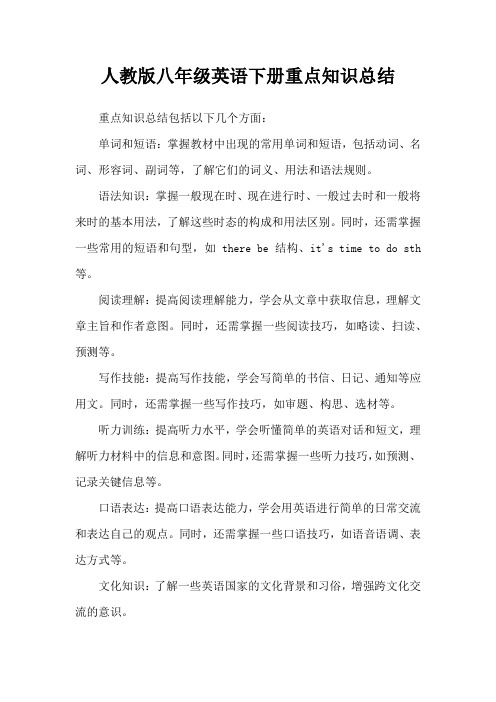
人教版八年级英语下册重点知识总结
重点知识总结包括以下几个方面:
单词和短语:掌握教材中出现的常用单词和短语,包括动词、名词、形容词、副词等,了解它们的词义、用法和语法规则。
语法知识:掌握一般现在时、现在进行时、一般过去时和一般将来时的基本用法,了解这些时态的构成和用法区别。
同时,还需掌握一些常用的短语和句型,如there be结构、it's time to do sth 等。
阅读理解:提高阅读理解能力,学会从文章中获取信息,理解文章主旨和作者意图。
同时,还需掌握一些阅读技巧,如略读、扫读、预测等。
写作技能:提高写作技能,学会写简单的书信、日记、通知等应用文。
同时,还需掌握一些写作技巧,如审题、构思、选材等。
听力训练:提高听力水平,学会听懂简单的英语对话和短文,理解听力材料中的信息和意图。
同时,还需掌握一些听力技巧,如预测、记录关键信息等。
口语表达:提高口语表达能力,学会用英语进行简单的日常交流和表达自己的观点。
同时,还需掌握一些口语技巧,如语音语调、表达方式等。
文化知识:了解一些英语国家的文化背景和习俗,增强跨文化交流的意识。
(完整版)人教版部编版八年级下册英语第三单元复习知识点梳理

(完整版)人教版部编版八年级下册英语第三单元复习知识点梳理
1. 语法知识点
- 一般现在时:表示经常性动作或现在的状态
- 一般过去时:表示过去发生或存在的动作或状态
- 现在进行时:表示现在正在进行的动作
- 过去进行时:表示过去某一时刻正在进行的动作
- 现在完成时:表示过去某一时刻发生的动作对现在产生的影响
- 过去完成时:表示过去某一时刻之前已完成的动作
2. 词汇知识点
- 动词的不定式
- 预先研究一些常见的动词短语
- 研究动词的过去分词形式
- 研究一些常见的形容词和副词
3. 句型知识点
- 肯定句:主语 + 动词 + 其他成分
- 否定句:主语 + 动词 + not + 其他成分
- 一般疑问句:助动词/系动词 + 主语 + 动词 + 其他成分?
- 特殊疑问句:疑问词 + 一般疑问句
4. 对话和情景交际
研究并熟悉课本中的对话和情景交际,理解对话中的语言表达和交流。
5. 阅读理解
通过阅读短文,理解文章大意,研究并掌握一些常见的词汇和表达方式。
6. 写作技巧
- 研究常用句式和表达方式
- 练写一些简短的句子和段落
- 注意语法和拼写错误的纠正
以上是人教版部编版八年级下册英语第三单元的复知识点梳理,希望对你的研究有所帮助。
*注意:此文档梳理的内容来源于人教版部编版八年级下册英
语教材,仅供参考学习使用。
*。
(完整word版)人教版八年级英语下册各单元知识点汇总
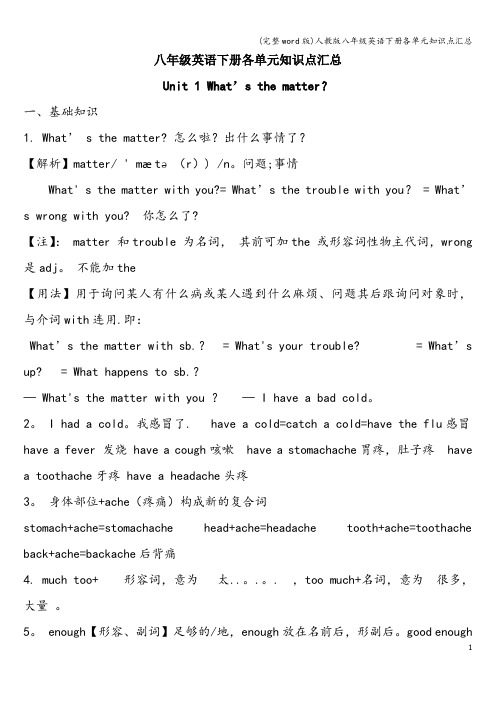
八年级英语下册各单元知识点汇总Unit 1 What’s the matter?一、基础知识1. What’ s the matter? 怎么啦?出什么事情了?【解析】matter/ ' mætə(r)) /n。
问题;事情What' s the matter with you?= What’s the trouble with you?= What’s wrong with you? 你怎么了?【注】: matter 和trouble 为名词,其前可加the 或形容词性物主代词,wrong是adj。
不能加the【用法】用于询问某人有什么病或某人遇到什么麻烦、问题其后跟询问对象时,与介词with连用.即:What’s the matter with sb.?= What's your trouble? = What’s up? = What happens to sb.?— What's the matter with you ?— I have a bad cold。
2。
I had a cold。
我感冒了. have a cold=catch a cold=have the flu感冒have a fever 发烧 have a cough咳嗽 have a stomachache胃疼,肚子疼 havea toothache牙疼 have a headache头疼3。
身体部位+ache(疼痛)构成新的复合词stomach+ache=stomachache head+ache=headache tooth+ache=toothache back+ache=backache后背痛4. much too+ 形容词,意为太..。
.。
. ,too much+名词,意为很多,大量。
5。
enough【形容、副词】足够的/地,enough放在名前后,形副后。
good enough足够好,enough money=much money6。
英语八年级下部编版知识点
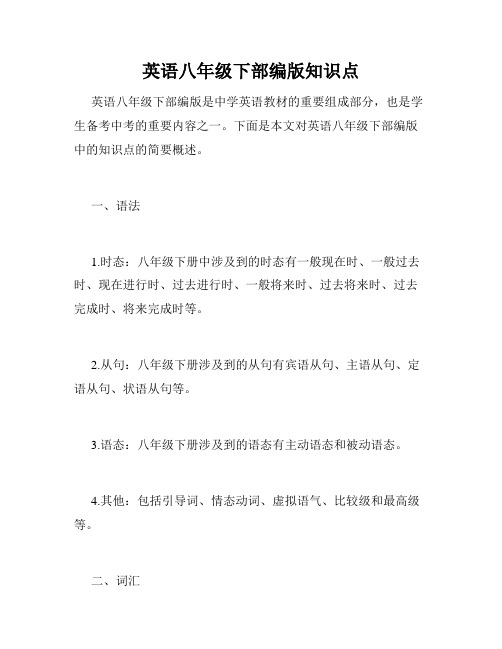
英语八年级下部编版知识点英语八年级下部编版是中学英语教材的重要组成部分,也是学生备考中考的重要内容之一。
下面是本文对英语八年级下部编版中的知识点的简要概述。
一、语法1.时态:八年级下册中涉及到的时态有一般现在时、一般过去时、现在进行时、过去进行时、一般将来时、过去将来时、过去完成时、将来完成时等。
2.从句:八年级下册涉及到的从句有宾语从句、主语从句、定语从句、状语从句等。
3.语态:八年级下册涉及到的语态有主动语态和被动语态。
4.其他:包括引导词、情态动词、虚拟语气、比较级和最高级等。
二、词汇1.单词:八年级下册的词汇量相对较大,包括常用词汇和学科词汇。
2.短语:八年级下册中常出现的短语有动词短语、名词短语、形容词短语、副词短语等。
3.固定搭配:八年级下册中常出现的固定搭配包括动词短语、名词短语、形容词短语、副词短语等。
三、句子1.基本句型:八年级下册中涉及到的基本句型包括简单句、并列句、复合句等。
2.句子成分:八年级下册中涉及到的句子成分包括主语、谓语、宾语、定语、状语、补语等。
3.句型变换:八年级下册中常出现的句型变换包括主动语态和被动语态、肯定句和否定句、一般疑问句和特殊疑问句等。
四、阅读1.阅读技巧:八年级下册中需要掌握的阅读技巧包括快速阅读、扫读、略读、逐字逐句阅读等。
2.阅读能力:八年级下册中要求学生有较好的阅读能力,能够理解文章的主旨大意、抓住重点和细节等。
五、写作1.句型:八年级下册中要求学生掌握一些常用的句型,如描述性句型、比较句型、转折句型、举例句型等。
2.词汇:八年级下册中要求学生运用学过的词汇进行写作。
3.写作能力:八年级下册中要求学生有较好的写作能力,能够进行简单的句子和段落的写作,并能够准确表达意思。
以上是英语八年级下部编版中的知识点概述,希望能够帮助同学们更好地学习英语。
人教版八年级下册英语知识点梳理总结

千里之行,始于足下。
人教版八年级下册英语知识点梳理总结人教版八年级下册的英语知识点主要包括以下内容:
1. 时态和语态
- 现在进行时
- 一般过去时
- 过去进行时
- 一般将来时
- 用被动语态表达
- 过去将来时
2. 介词
- 表示时间的常用介词
- 表示地点的常用介词
- 表示方式的常用介词
- 表示原因的常用介词
- 表示目的的常用介词
- 表示比较的常用介词
- 表示运动方向的常用介词
3. 短语和固定搭配
- 动词短语
- 名词短语
- 形容词短语
4. 从句
- 定义性从句
第1页/共3页
锲而不舍,金石可镂。
- 修饰性从句
- 原因状语从句
- 结果状语从句
- 条件状语从句
- 目的状语从句
- 时间状语从句
- 地点状语从句
5. 连词
- 并列连词
- 选择连词
- 原因连词
- 结果连词
- 条件连词
- 转折连词
- 目的连词
- 时间连词
- 地点连词
6. 数词
- 基数词
- 序数词
- 分数和百分数
7. 非谓语动词
- 不定式
- 动名词
- 现在分词
- 过去分词
- 不定式作定语
千里之行,始于足下。
以上是人教版八年级下册英语知识点的梳理总结,希望能对你有所帮助。
如有任何更多的问题,请随时提问。
第3页/共3页。
人教版八年级英语下册第二单元重点知识点梳理
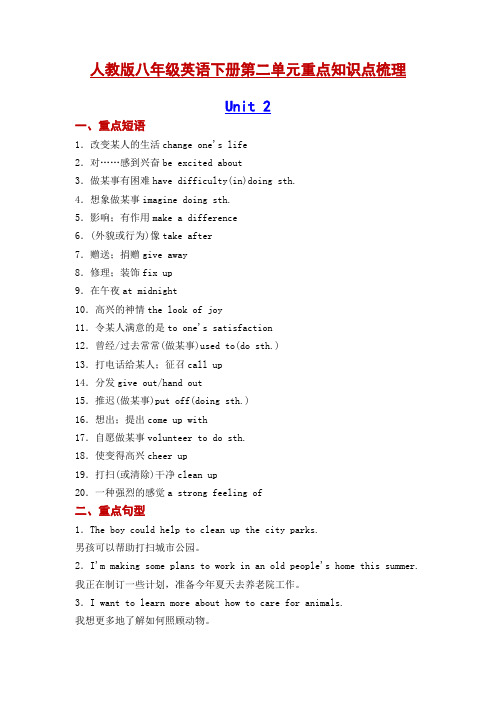
(2)作不及物动词,如:
Something unexpected has turned up.出现了令人意外的情况。
(3)既可作及物动词又可作不及物动词,如:
你的帮助使我拥有Lucky成为可能。
三、重点语法
动词短语
动词短语就是有些动词可以和一些别的词构成短语(以动词为中心),表达一个概念,其作用和一个单独动词差不多的一种固定搭配。在实际使用中,通常会把动词短语当成一个整体。
动词短语有以下常见类型:1. Nhomakorabea词+副词
(1)作及物动词,如:
He brought up his children strictly.
The barrel of gunpowder blew up.(不及物)火药桶爆炸了。
The soldiers blew up the bridge.(及物)士兵们把桥炸毁了。
2.动词+介词
动词与介词构成的词组在词义上相当于一个及物动词,宾语总是在介词后面,如:
I don't care for television.我不很喜欢电视。(care for=like)
3.动词+副词+介词
在这类动词短语中,动词、副词、介词紧密结合,是动副词组和动介词组的合成体,词义上相当于一个及物动词。它兼有以上两类短语动词的特点,但宾语总是位于介词之后,如:
get on/along with(与……相处)catch up with(赶上,跟上)
We must work hard to make up for the lost time.
- 1、下载文档前请自行甄别文档内容的完整性,平台不提供额外的编辑、内容补充、找答案等附加服务。
- 2、"仅部分预览"的文档,不可在线预览部分如存在完整性等问题,可反馈申请退款(可完整预览的文档不适用该条件!)。
- 3、如文档侵犯您的权益,请联系客服反馈,我们会尽快为您处理(人工客服工作时间:9:00-18:30)。
人教部编版初二下册英语重点知识点梳理
Unit 5 Topic 1
【重点词组】
1. invite sb. to do sth. 邀请某人做某事
2.one of +形容词最高级+ 名词复数
3. say thanks/hello/sorry/good-bye to sb.
向某人致谢/问好/道歉/告别
4. feel/taste/smell/look/sound/seem +adj.
5. seem to do sth.
seem+adj.
it seems that+从句
6. a ticket for/to sth.一张……的票
7. lonely adj.孤独的
alone adj./adv.独自的,一个人的
8. because of+n./pron/v-ing 因为,由于
9. cheer sb. up使某人振作起来
10. care for =take care of = look after照顾
11. come into being 形成,产生
12. be full of = be filled with充满……
13. agree with sb.同意某人
14. make peace with sb.与某人和平相处
15. in the end =at last = finally最后,最终
16. be popular with sb.受某人欢迎
【词形变化】
1.invite v.邀请
invitation n.邀请
2.disappionted adj.失望的,沮丧的
disappointment n.失望,沮丧
disappoint v.使失望
3.excite v.使激动,使兴奋
excited adj.兴奋的,激动的(修饰人)
exciting adj.令人兴奋的,使人激动的(修饰物)4.main adj.主要的
mainly adv.主要地
5.face n.脸,面部
facial adj.面部的
6.worry v.担心
worried adj.担心的,担忧的
【重点句型】
1.--How are you doing?你好吗?
--Very well.非常好。
2.What a pity!多么遗憾呀!
3.—How do the flowers smell?
--They smell nice.
--花闻起来怎么样?
--很好。
4.He seems a little unhappy.
他似乎有点不开心。
5.How did the music sound?
音乐听起来怎么样?
6.Please say thanks to your mom for us.
请代我向你的妈妈致谢。
Unit 5 Topic 2
【重点短语】
1.do badly in=be bad at在某方面做的差
2.be strict with sb.对某人要求严格
3.have a talk with sb.与某人交谈
4.be worried about=worry about担心……
5.take it easy放松点,别紧张
6.fail the English exam英语考试不及格
7.fail to do sth.失败做某事
8.at one’s age 在某人这个年龄时
9.tell jokes 讲笑话
10.sb. find/think it+adj. to do sth.
某人认为/发现做某事是……
11.be kind/friendly to sb.对某人友好
12. wish to do sth./hope to do sth.希望做某事
wish sb. to do sth.希望某人做某事
sb. wish/hope that...某人希望……
13.what’s more 而且
14.that替代前面所提到可数名词单数或不可数名词
those替代前面所提到可数名词的复数
15.be afraid of doing sth.
be afraid to do sth.害怕做某事
16.as+adj/adv.(原级)+as 和……一样
not as/so…as (as…as否定形式)
17.make faces 做鬼脸
18.refuse to do sth. 拒绝做某事
19.deal with
do with 处理,解决
20.go to the movies 去看电影
21.no longer=not…any longer不再……
22.though/even though
虽然,尽管(不能和but连用,但可与still,yet连用)23.be/get used to doing sth.习惯于做某事
used to do sth.习惯于做某事
【词形变化】
1.sad adj. 伤心的,悲伤的
sadly adv,
sadness n
2.almost/nearly adv.几乎,差不多
3. fair adj. 公平的
unfair adj,不公平的
e v./n 使用/用途
useful adj. 有用的
useless adj. 无用的
ual adj.通常的,平常的
usually adv.通常
6.love v.爱,热爱
lovely adj.可爱的
7.help v.帮助
helpful adj.有用的,有益的【重点句型】
1. I’m sorry/glad to hear that.
听到这我很难过/高兴。
2. What seems to be the problem? 出了什么问题?
3. Thank you for telling me.
谢谢你告诉我。
4. --How are you feeling today?
你今天感觉怎么样?
5. I’m feeling better now.
我现在感觉好多了。
6. I’m feeling really sad because I failed the English exam.
我感觉真的很伤心因为我英语考试不及格。
7. Why don’t you talk to someone when you feel sad?
当你伤心的时候为什么不和某人交谈下呢?
8. Who do you want to make friends with?
你想和谁交朋友?
9. There, there! It will be OK.
好了,好了!一切都会好起来的。
10. Are you OK today?
你今天好吗?
11. I find it difficult to learn English well.
我发现把英语学好很难。
12. Don’t worry, I’ll help you with it.
别担心,我会帮助你的。
13. You’re so kind to me.
你对我如此好。
14. How time flies!
时光飞逝!
15.I live as happily as before.
我像以前一样幸福的生活。
16.It seemed that the people here were not so/as friendly as before.
似乎这儿的人们没有以前那么友好。
17. I was really upset and lonely.
我今天真的很心烦和孤独。
18. Would you like to become my friend?
你愿意成为我的朋友吗?
19. I think I should have a talk with her.
我认为我应该和她谈谈。
Unit 5 Topic 3
【重点短语】
1.have a test 测试,测验
2 .get/be nervous 紧张
3.give a speech 做演讲
4.practice doing sth 练习做某事
5.be sick/ill 生病
6.be confident about 对……自信
7.in a bad/good mood 心情差/好。
